University Case Study: Marie's Recovery Focused Nursing Care Plan
VerifiedAdded on 2023/01/13
|12
|2679
|49
Report
AI Summary
This report presents a recovery-focused nursing care plan for Marie, a 31-year-old married woman diagnosed with Major Depressive Disorder and episodes of Post Natal Depression. The case study details Marie's struggles with social isolation, difficulties in daily living, loss of self-esteem, and suicidal ideation. It identifies consumer priorities, goals, and interventions aimed at restoring her sense of self-worth, improving her engagement in activities, and enhancing her self-care. The plan includes collaborative approaches involving the patient, case manager, and family, with a focus on addressing triggers, promoting positive factors, and utilizing Cognitive Behavioral Therapy (CBT) when needed. The report also emphasizes the importance of self-recognition, mindfulness, and family support in Marie's recovery process, with ongoing evaluations to assess the care plan's effectiveness.
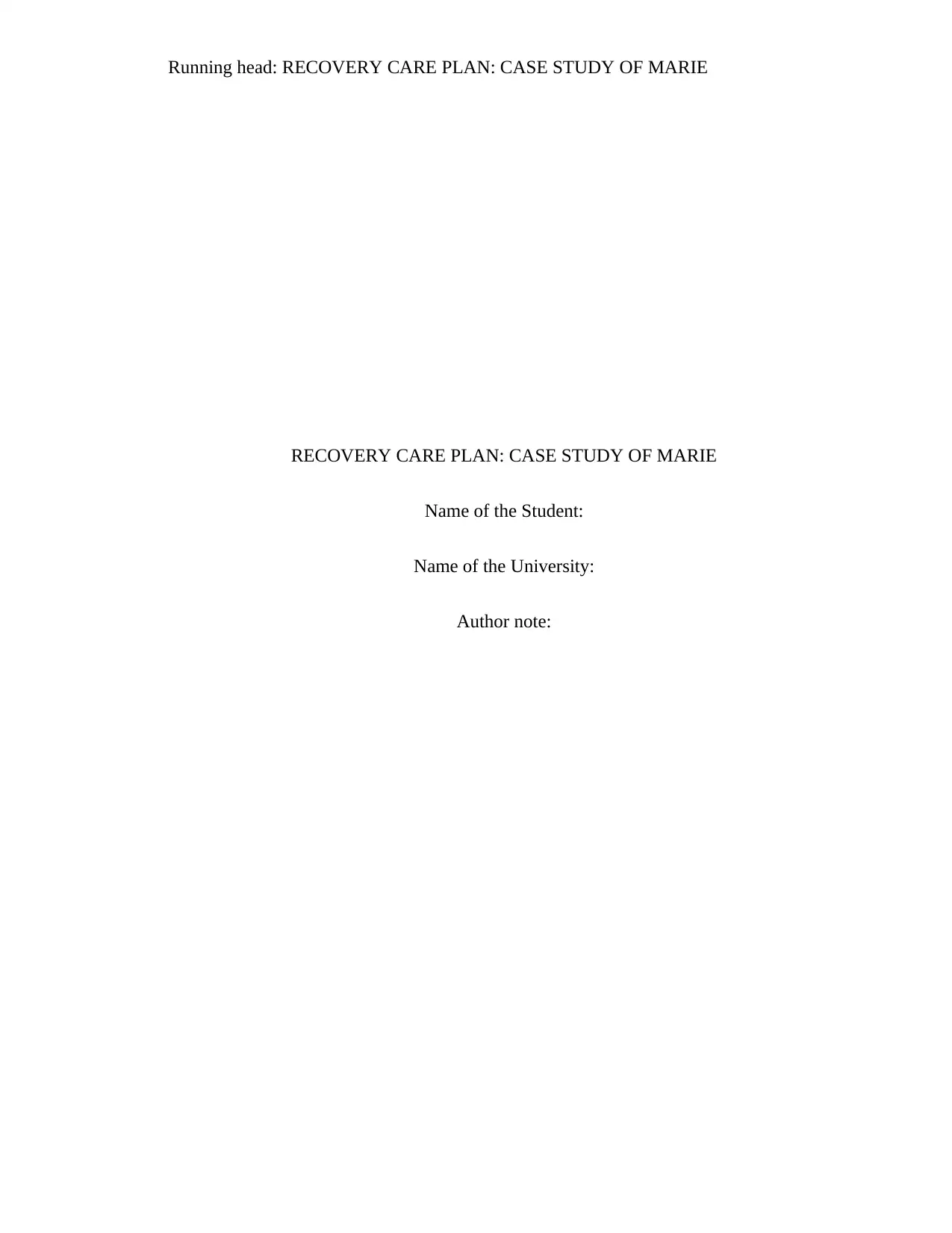
Running head: RECOVERY CARE PLAN: CASE STUDY OF MARIE
RECOVERY CARE PLAN: CASE STUDY OF MARIE
Name of the Student:
Name of the University:
Author note:
RECOVERY CARE PLAN: CASE STUDY OF MARIE
Name of the Student:
Name of the University:
Author note:
Paraphrase This Document
Need a fresh take? Get an instant paraphrase of this document with our AI Paraphraser
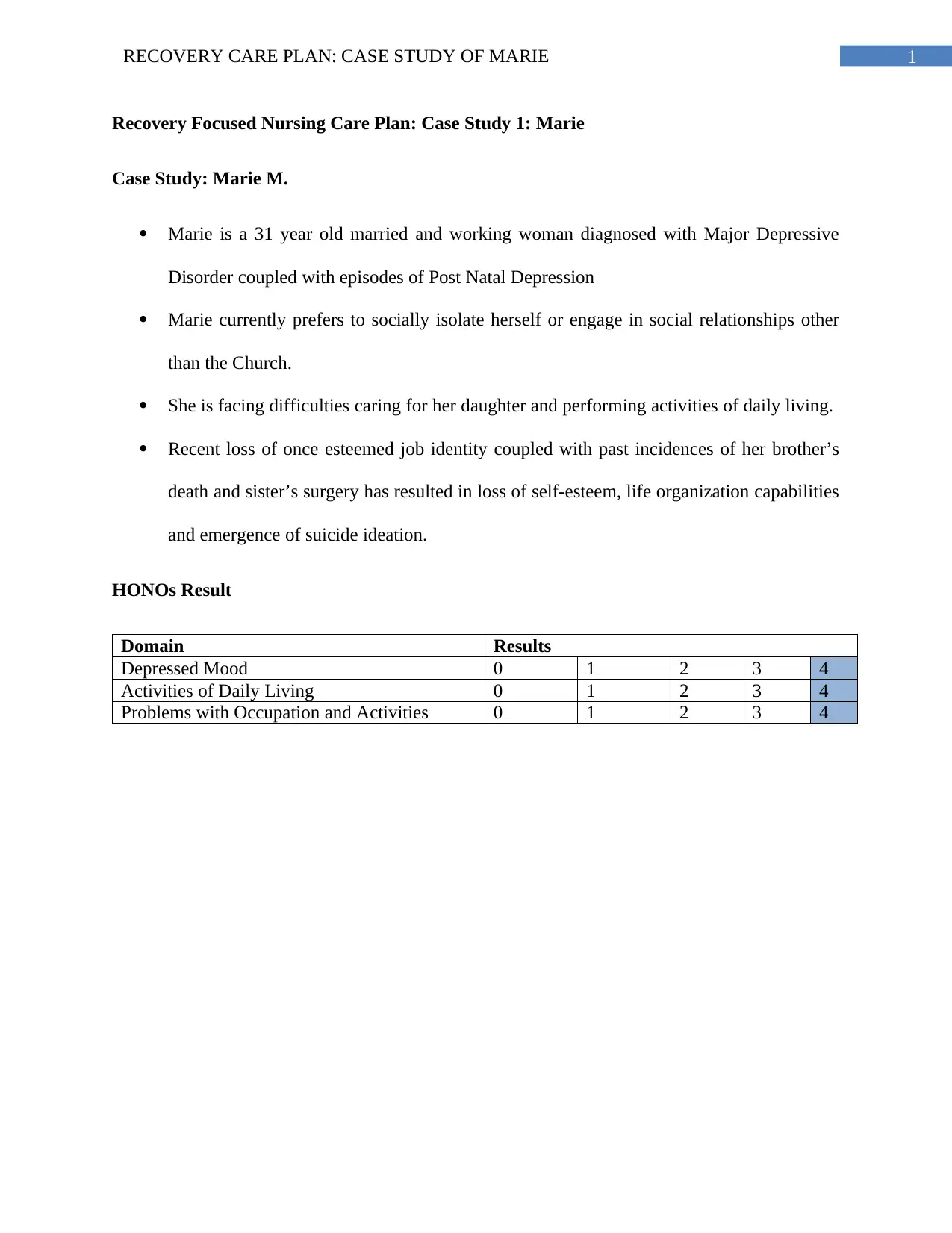
1RECOVERY CARE PLAN: CASE STUDY OF MARIE
Recovery Focused Nursing Care Plan: Case Study 1: Marie
Case Study: Marie M.
Marie is a 31 year old married and working woman diagnosed with Major Depressive
Disorder coupled with episodes of Post Natal Depression
Marie currently prefers to socially isolate herself or engage in social relationships other
than the Church.
She is facing difficulties caring for her daughter and performing activities of daily living.
Recent loss of once esteemed job identity coupled with past incidences of her brother’s
death and sister’s surgery has resulted in loss of self-esteem, life organization capabilities
and emergence of suicide ideation.
HONOs Result
Domain Results
Depressed Mood 0 1 2 3 4
Activities of Daily Living 0 1 2 3 4
Problems with Occupation and Activities 0 1 2 3 4
Recovery Focused Nursing Care Plan: Case Study 1: Marie
Case Study: Marie M.
Marie is a 31 year old married and working woman diagnosed with Major Depressive
Disorder coupled with episodes of Post Natal Depression
Marie currently prefers to socially isolate herself or engage in social relationships other
than the Church.
She is facing difficulties caring for her daughter and performing activities of daily living.
Recent loss of once esteemed job identity coupled with past incidences of her brother’s
death and sister’s surgery has resulted in loss of self-esteem, life organization capabilities
and emergence of suicide ideation.
HONOs Result
Domain Results
Depressed Mood 0 1 2 3 4
Activities of Daily Living 0 1 2 3 4
Problems with Occupation and Activities 0 1 2 3 4
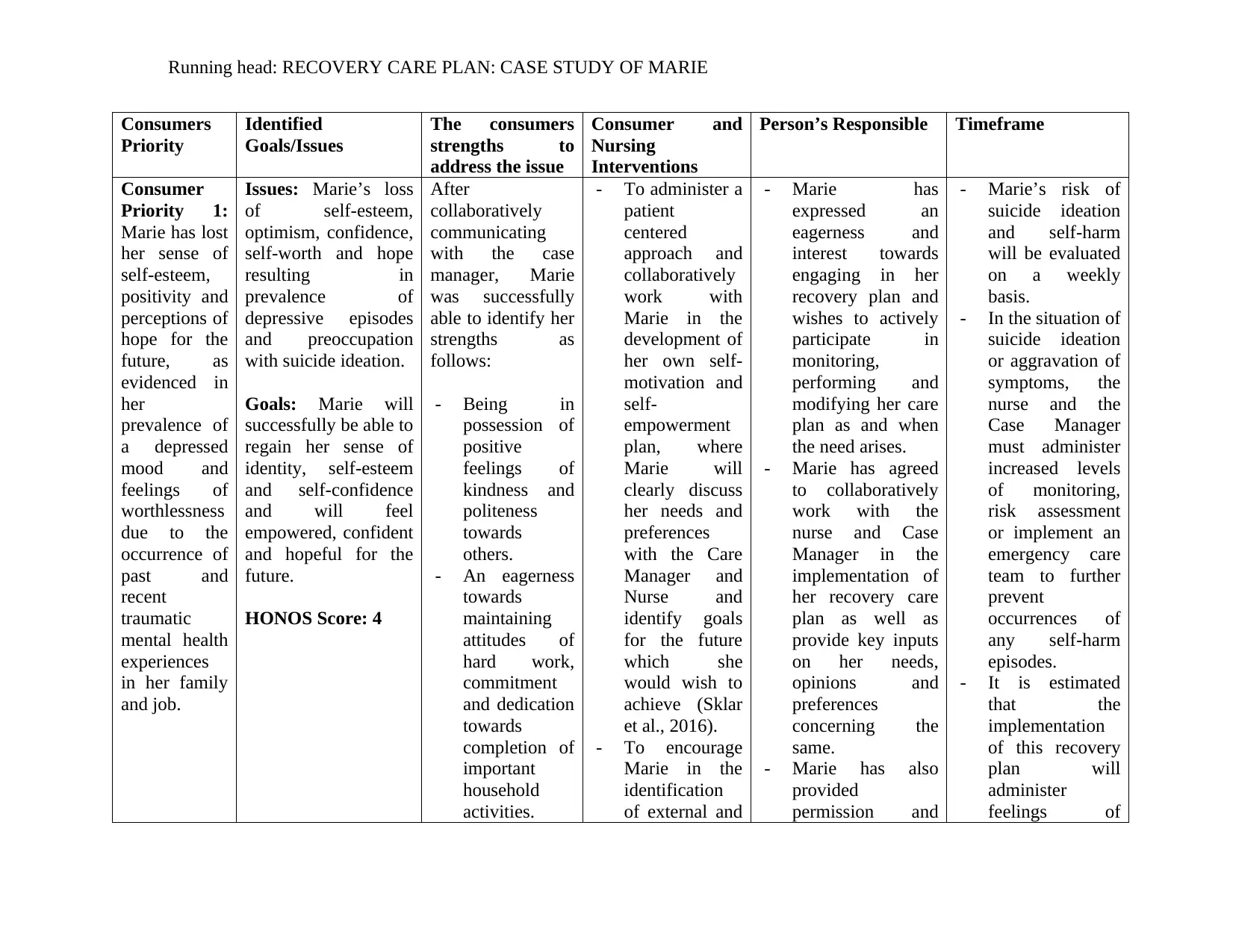
Running head: RECOVERY CARE PLAN: CASE STUDY OF MARIE
Consumers
Priority
Identified
Goals/Issues
The consumers
strengths to
address the issue
Consumer and
Nursing
Interventions
Person’s Responsible Timeframe
Consumer
Priority 1:
Marie has lost
her sense of
self-esteem,
positivity and
perceptions of
hope for the
future, as
evidenced in
her
prevalence of
a depressed
mood and
feelings of
worthlessness
due to the
occurrence of
past and
recent
traumatic
mental health
experiences
in her family
and job.
Issues: Marie’s loss
of self-esteem,
optimism, confidence,
self-worth and hope
resulting in
prevalence of
depressive episodes
and preoccupation
with suicide ideation.
Goals: Marie will
successfully be able to
regain her sense of
identity, self-esteem
and self-confidence
and will feel
empowered, confident
and hopeful for the
future.
HONOS Score: 4
After
collaboratively
communicating
with the case
manager, Marie
was successfully
able to identify her
strengths as
follows:
- Being in
possession of
positive
feelings of
kindness and
politeness
towards
others.
- An eagerness
towards
maintaining
attitudes of
hard work,
commitment
and dedication
towards
completion of
important
household
activities.
- To administer a
patient
centered
approach and
collaboratively
work with
Marie in the
development of
her own self-
motivation and
self-
empowerment
plan, where
Marie will
clearly discuss
her needs and
preferences
with the Care
Manager and
Nurse and
identify goals
for the future
which she
would wish to
achieve (Sklar
et al., 2016).
- To encourage
Marie in the
identification
of external and
- Marie has
expressed an
eagerness and
interest towards
engaging in her
recovery plan and
wishes to actively
participate in
monitoring,
performing and
modifying her care
plan as and when
the need arises.
- Marie has agreed
to collaboratively
work with the
nurse and Case
Manager in the
implementation of
her recovery care
plan as well as
provide key inputs
on her needs,
opinions and
preferences
concerning the
same.
- Marie has also
provided
permission and
- Marie’s risk of
suicide ideation
and self-harm
will be evaluated
on a weekly
basis.
- In the situation of
suicide ideation
or aggravation of
symptoms, the
nurse and the
Case Manager
must administer
increased levels
of monitoring,
risk assessment
or implement an
emergency care
team to further
prevent
occurrences of
any self-harm
episodes.
- It is estimated
that the
implementation
of this recovery
plan will
administer
feelings of
Consumers
Priority
Identified
Goals/Issues
The consumers
strengths to
address the issue
Consumer and
Nursing
Interventions
Person’s Responsible Timeframe
Consumer
Priority 1:
Marie has lost
her sense of
self-esteem,
positivity and
perceptions of
hope for the
future, as
evidenced in
her
prevalence of
a depressed
mood and
feelings of
worthlessness
due to the
occurrence of
past and
recent
traumatic
mental health
experiences
in her family
and job.
Issues: Marie’s loss
of self-esteem,
optimism, confidence,
self-worth and hope
resulting in
prevalence of
depressive episodes
and preoccupation
with suicide ideation.
Goals: Marie will
successfully be able to
regain her sense of
identity, self-esteem
and self-confidence
and will feel
empowered, confident
and hopeful for the
future.
HONOS Score: 4
After
collaboratively
communicating
with the case
manager, Marie
was successfully
able to identify her
strengths as
follows:
- Being in
possession of
positive
feelings of
kindness and
politeness
towards
others.
- An eagerness
towards
maintaining
attitudes of
hard work,
commitment
and dedication
towards
completion of
important
household
activities.
- To administer a
patient
centered
approach and
collaboratively
work with
Marie in the
development of
her own self-
motivation and
self-
empowerment
plan, where
Marie will
clearly discuss
her needs and
preferences
with the Care
Manager and
Nurse and
identify goals
for the future
which she
would wish to
achieve (Sklar
et al., 2016).
- To encourage
Marie in the
identification
of external and
- Marie has
expressed an
eagerness and
interest towards
engaging in her
recovery plan and
wishes to actively
participate in
monitoring,
performing and
modifying her care
plan as and when
the need arises.
- Marie has agreed
to collaboratively
work with the
nurse and Case
Manager in the
implementation of
her recovery care
plan as well as
provide key inputs
on her needs,
opinions and
preferences
concerning the
same.
- Marie has also
provided
permission and
- Marie’s risk of
suicide ideation
and self-harm
will be evaluated
on a weekly
basis.
- In the situation of
suicide ideation
or aggravation of
symptoms, the
nurse and the
Case Manager
must administer
increased levels
of monitoring,
risk assessment
or implement an
emergency care
team to further
prevent
occurrences of
any self-harm
episodes.
- It is estimated
that the
implementation
of this recovery
plan will
administer
feelings of
⊘ This is a preview!⊘
Do you want full access?
Subscribe today to unlock all pages.

Trusted by 1+ million students worldwide
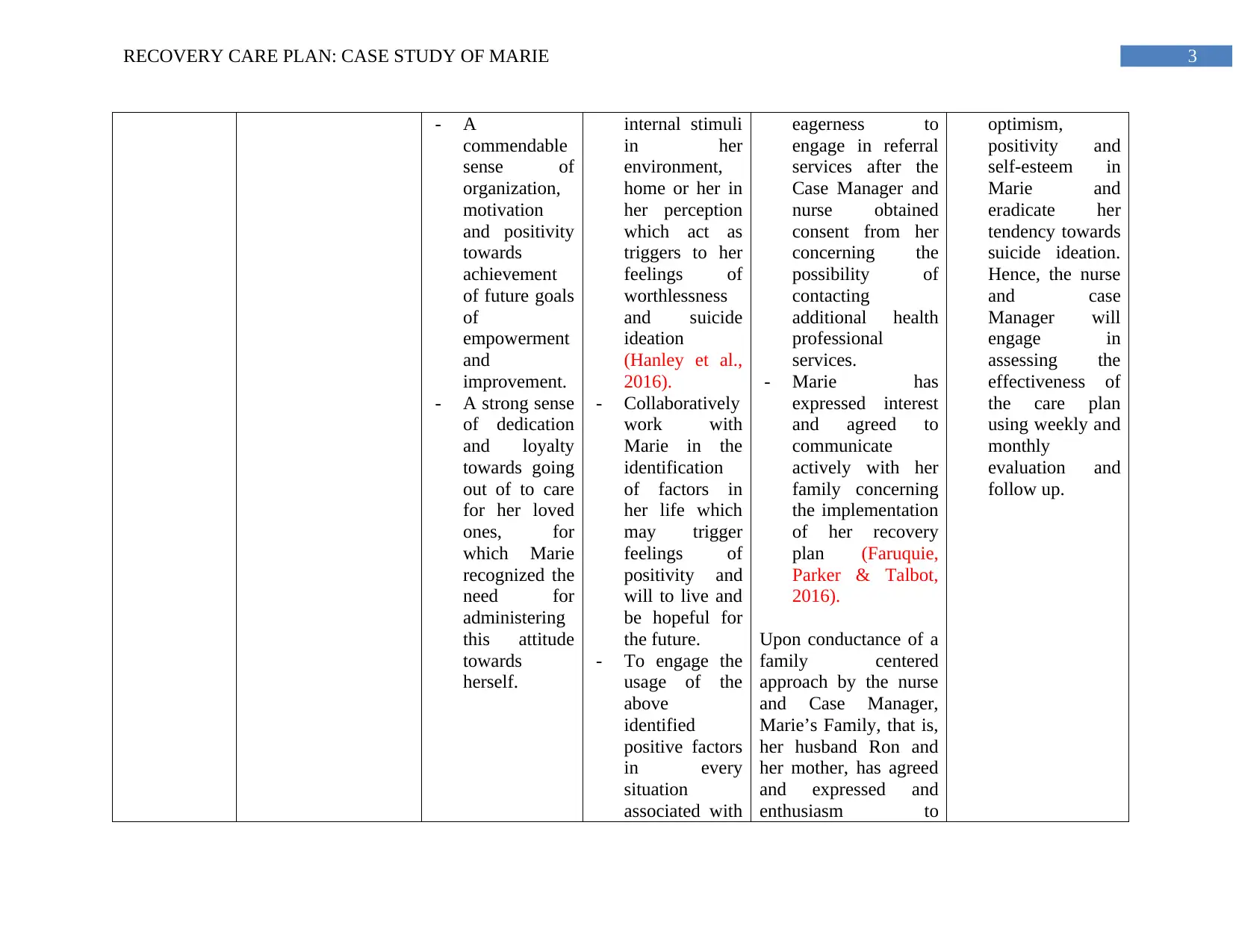
3RECOVERY CARE PLAN: CASE STUDY OF MARIE
- A
commendable
sense of
organization,
motivation
and positivity
towards
achievement
of future goals
of
empowerment
and
improvement.
- A strong sense
of dedication
and loyalty
towards going
out of to care
for her loved
ones, for
which Marie
recognized the
need for
administering
this attitude
towards
herself.
internal stimuli
in her
environment,
home or her in
her perception
which act as
triggers to her
feelings of
worthlessness
and suicide
ideation
(Hanley et al.,
2016).
- Collaboratively
work with
Marie in the
identification
of factors in
her life which
may trigger
feelings of
positivity and
will to live and
be hopeful for
the future.
- To engage the
usage of the
above
identified
positive factors
in every
situation
associated with
eagerness to
engage in referral
services after the
Case Manager and
nurse obtained
consent from her
concerning the
possibility of
contacting
additional health
professional
services.
- Marie has
expressed interest
and agreed to
communicate
actively with her
family concerning
the implementation
of her recovery
plan (Faruquie,
Parker & Talbot,
2016).
Upon conductance of a
family centered
approach by the nurse
and Case Manager,
Marie’s Family, that is,
her husband Ron and
her mother, has agreed
and expressed and
enthusiasm to
optimism,
positivity and
self-esteem in
Marie and
eradicate her
tendency towards
suicide ideation.
Hence, the nurse
and case
Manager will
engage in
assessing the
effectiveness of
the care plan
using weekly and
monthly
evaluation and
follow up.
- A
commendable
sense of
organization,
motivation
and positivity
towards
achievement
of future goals
of
empowerment
and
improvement.
- A strong sense
of dedication
and loyalty
towards going
out of to care
for her loved
ones, for
which Marie
recognized the
need for
administering
this attitude
towards
herself.
internal stimuli
in her
environment,
home or her in
her perception
which act as
triggers to her
feelings of
worthlessness
and suicide
ideation
(Hanley et al.,
2016).
- Collaboratively
work with
Marie in the
identification
of factors in
her life which
may trigger
feelings of
positivity and
will to live and
be hopeful for
the future.
- To engage the
usage of the
above
identified
positive factors
in every
situation
associated with
eagerness to
engage in referral
services after the
Case Manager and
nurse obtained
consent from her
concerning the
possibility of
contacting
additional health
professional
services.
- Marie has
expressed interest
and agreed to
communicate
actively with her
family concerning
the implementation
of her recovery
plan (Faruquie,
Parker & Talbot,
2016).
Upon conductance of a
family centered
approach by the nurse
and Case Manager,
Marie’s Family, that is,
her husband Ron and
her mother, has agreed
and expressed and
enthusiasm to
optimism,
positivity and
self-esteem in
Marie and
eradicate her
tendency towards
suicide ideation.
Hence, the nurse
and case
Manager will
engage in
assessing the
effectiveness of
the care plan
using weekly and
monthly
evaluation and
follow up.
Paraphrase This Document
Need a fresh take? Get an instant paraphrase of this document with our AI Paraphraser
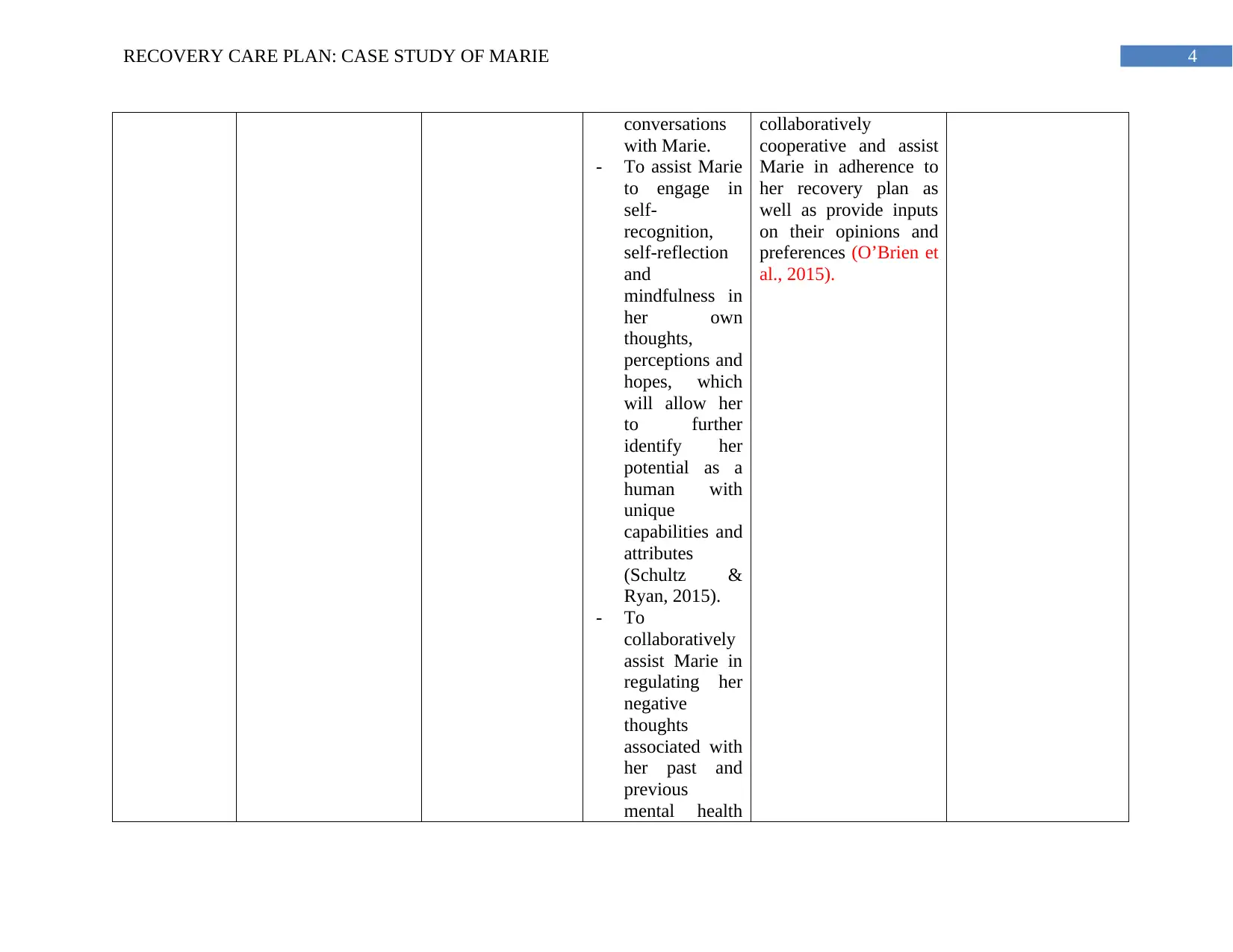
4RECOVERY CARE PLAN: CASE STUDY OF MARIE
conversations
with Marie.
- To assist Marie
to engage in
self-
recognition,
self-reflection
and
mindfulness in
her own
thoughts,
perceptions and
hopes, which
will allow her
to further
identify her
potential as a
human with
unique
capabilities and
attributes
(Schultz &
Ryan, 2015).
- To
collaboratively
assist Marie in
regulating her
negative
thoughts
associated with
her past and
previous
mental health
collaboratively
cooperative and assist
Marie in adherence to
her recovery plan as
well as provide inputs
on their opinions and
preferences (O’Brien et
al., 2015).
conversations
with Marie.
- To assist Marie
to engage in
self-
recognition,
self-reflection
and
mindfulness in
her own
thoughts,
perceptions and
hopes, which
will allow her
to further
identify her
potential as a
human with
unique
capabilities and
attributes
(Schultz &
Ryan, 2015).
- To
collaboratively
assist Marie in
regulating her
negative
thoughts
associated with
her past and
previous
mental health
collaboratively
cooperative and assist
Marie in adherence to
her recovery plan as
well as provide inputs
on their opinions and
preferences (O’Brien et
al., 2015).
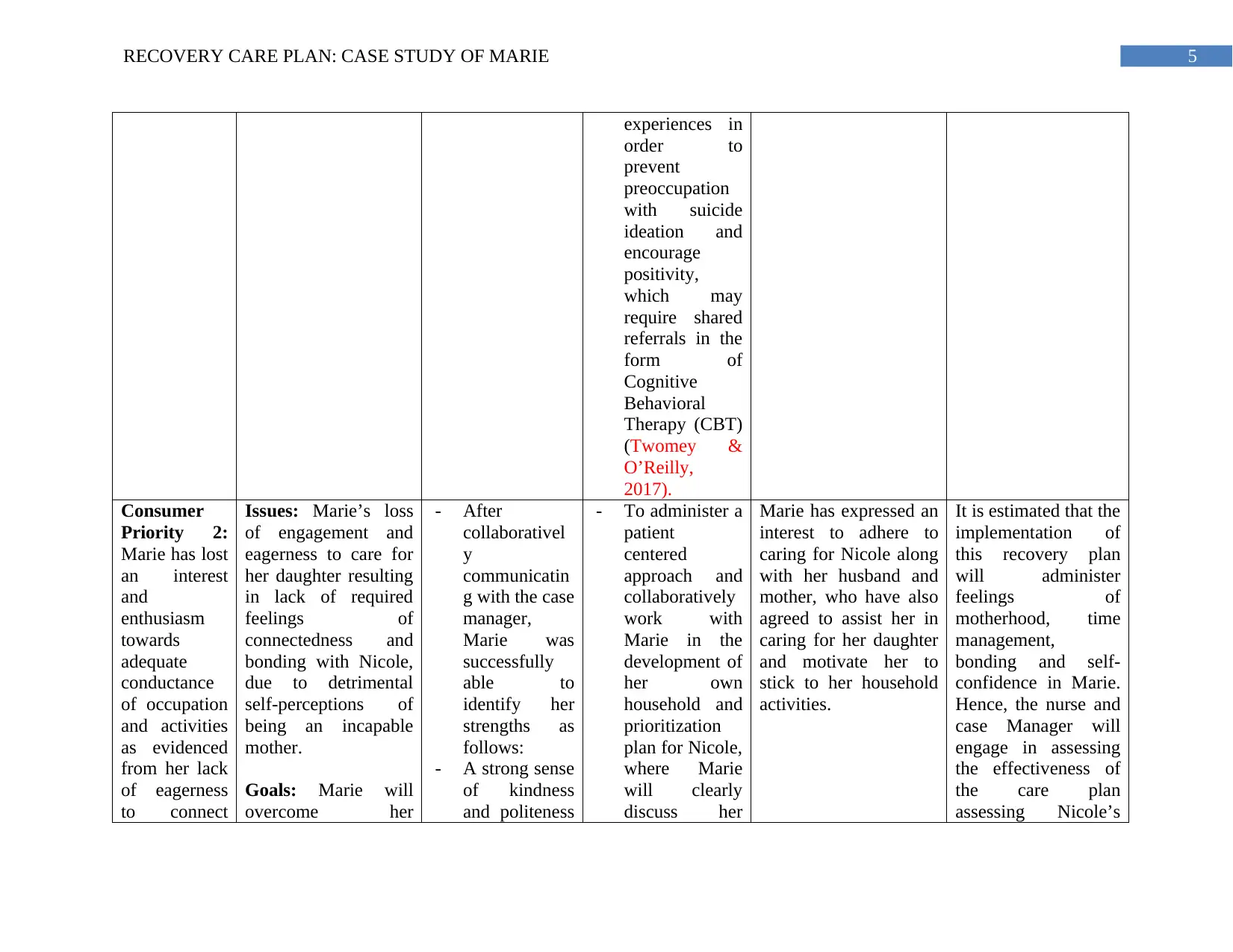
5RECOVERY CARE PLAN: CASE STUDY OF MARIE
experiences in
order to
prevent
preoccupation
with suicide
ideation and
encourage
positivity,
which may
require shared
referrals in the
form of
Cognitive
Behavioral
Therapy (CBT)
(Twomey &
O’Reilly,
2017).
Consumer
Priority 2:
Marie has lost
an interest
and
enthusiasm
towards
adequate
conductance
of occupation
and activities
as evidenced
from her lack
of eagerness
to connect
Issues: Marie’s loss
of engagement and
eagerness to care for
her daughter resulting
in lack of required
feelings of
connectedness and
bonding with Nicole,
due to detrimental
self-perceptions of
being an incapable
mother.
Goals: Marie will
overcome her
- After
collaborativel
y
communicatin
g with the case
manager,
Marie was
successfully
able to
identify her
strengths as
follows:
- A strong sense
of kindness
and politeness
- To administer a
patient
centered
approach and
collaboratively
work with
Marie in the
development of
her own
household and
prioritization
plan for Nicole,
where Marie
will clearly
discuss her
Marie has expressed an
interest to adhere to
caring for Nicole along
with her husband and
mother, who have also
agreed to assist her in
caring for her daughter
and motivate her to
stick to her household
activities.
It is estimated that the
implementation of
this recovery plan
will administer
feelings of
motherhood, time
management,
bonding and self-
confidence in Marie.
Hence, the nurse and
case Manager will
engage in assessing
the effectiveness of
the care plan
assessing Nicole’s
experiences in
order to
prevent
preoccupation
with suicide
ideation and
encourage
positivity,
which may
require shared
referrals in the
form of
Cognitive
Behavioral
Therapy (CBT)
(Twomey &
O’Reilly,
2017).
Consumer
Priority 2:
Marie has lost
an interest
and
enthusiasm
towards
adequate
conductance
of occupation
and activities
as evidenced
from her lack
of eagerness
to connect
Issues: Marie’s loss
of engagement and
eagerness to care for
her daughter resulting
in lack of required
feelings of
connectedness and
bonding with Nicole,
due to detrimental
self-perceptions of
being an incapable
mother.
Goals: Marie will
overcome her
- After
collaborativel
y
communicatin
g with the case
manager,
Marie was
successfully
able to
identify her
strengths as
follows:
- A strong sense
of kindness
and politeness
- To administer a
patient
centered
approach and
collaboratively
work with
Marie in the
development of
her own
household and
prioritization
plan for Nicole,
where Marie
will clearly
discuss her
Marie has expressed an
interest to adhere to
caring for Nicole along
with her husband and
mother, who have also
agreed to assist her in
caring for her daughter
and motivate her to
stick to her household
activities.
It is estimated that the
implementation of
this recovery plan
will administer
feelings of
motherhood, time
management,
bonding and self-
confidence in Marie.
Hence, the nurse and
case Manager will
engage in assessing
the effectiveness of
the care plan
assessing Nicole’s
⊘ This is a preview!⊘
Do you want full access?
Subscribe today to unlock all pages.

Trusted by 1+ million students worldwide
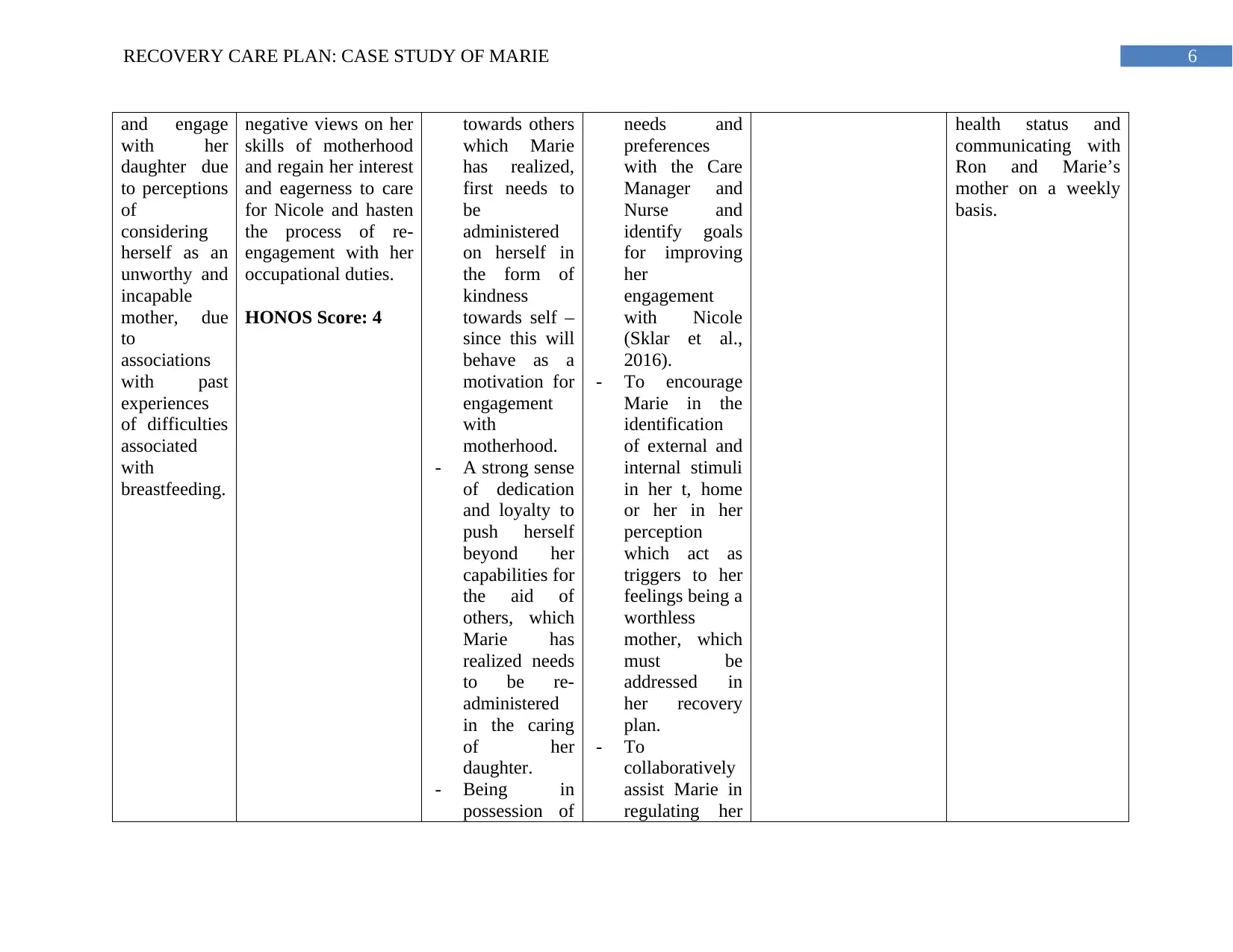
6RECOVERY CARE PLAN: CASE STUDY OF MARIE
and engage
with her
daughter due
to perceptions
of
considering
herself as an
unworthy and
incapable
mother, due
to
associations
with past
experiences
of difficulties
associated
with
breastfeeding.
negative views on her
skills of motherhood
and regain her interest
and eagerness to care
for Nicole and hasten
the process of re-
engagement with her
occupational duties.
HONOS Score: 4
towards others
which Marie
has realized,
first needs to
be
administered
on herself in
the form of
kindness
towards self –
since this will
behave as a
motivation for
engagement
with
motherhood.
- A strong sense
of dedication
and loyalty to
push herself
beyond her
capabilities for
the aid of
others, which
Marie has
realized needs
to be re-
administered
in the caring
of her
daughter.
- Being in
possession of
needs and
preferences
with the Care
Manager and
Nurse and
identify goals
for improving
her
engagement
with Nicole
(Sklar et al.,
2016).
- To encourage
Marie in the
identification
of external and
internal stimuli
in her t, home
or her in her
perception
which act as
triggers to her
feelings being a
worthless
mother, which
must be
addressed in
her recovery
plan.
- To
collaboratively
assist Marie in
regulating her
health status and
communicating with
Ron and Marie’s
mother on a weekly
basis.
and engage
with her
daughter due
to perceptions
of
considering
herself as an
unworthy and
incapable
mother, due
to
associations
with past
experiences
of difficulties
associated
with
breastfeeding.
negative views on her
skills of motherhood
and regain her interest
and eagerness to care
for Nicole and hasten
the process of re-
engagement with her
occupational duties.
HONOS Score: 4
towards others
which Marie
has realized,
first needs to
be
administered
on herself in
the form of
kindness
towards self –
since this will
behave as a
motivation for
engagement
with
motherhood.
- A strong sense
of dedication
and loyalty to
push herself
beyond her
capabilities for
the aid of
others, which
Marie has
realized needs
to be re-
administered
in the caring
of her
daughter.
- Being in
possession of
needs and
preferences
with the Care
Manager and
Nurse and
identify goals
for improving
her
engagement
with Nicole
(Sklar et al.,
2016).
- To encourage
Marie in the
identification
of external and
internal stimuli
in her t, home
or her in her
perception
which act as
triggers to her
feelings being a
worthless
mother, which
must be
addressed in
her recovery
plan.
- To
collaboratively
assist Marie in
regulating her
health status and
communicating with
Ron and Marie’s
mother on a weekly
basis.
Paraphrase This Document
Need a fresh take? Get an instant paraphrase of this document with our AI Paraphraser
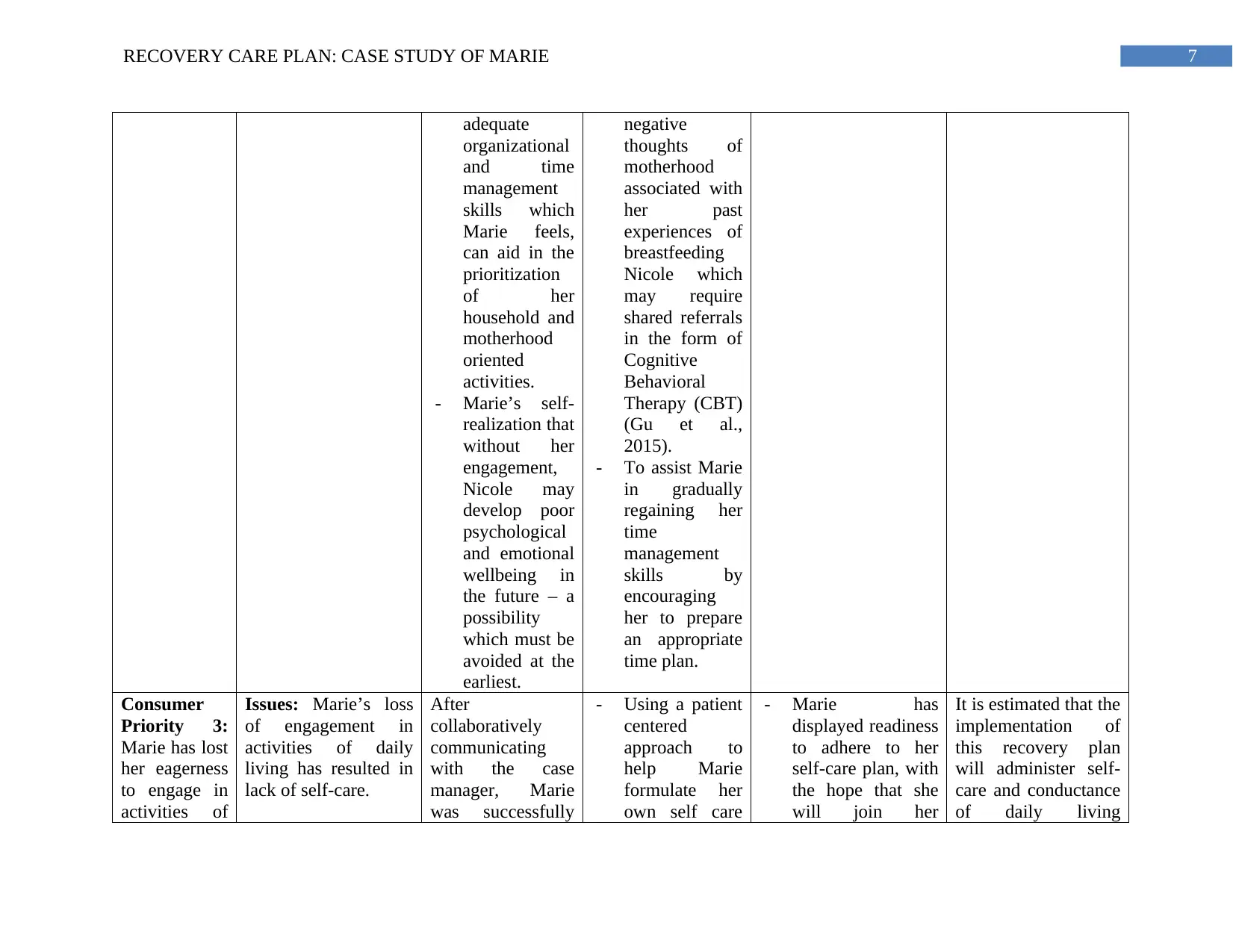
7RECOVERY CARE PLAN: CASE STUDY OF MARIE
adequate
organizational
and time
management
skills which
Marie feels,
can aid in the
prioritization
of her
household and
motherhood
oriented
activities.
- Marie’s self-
realization that
without her
engagement,
Nicole may
develop poor
psychological
and emotional
wellbeing in
the future – a
possibility
which must be
avoided at the
earliest.
negative
thoughts of
motherhood
associated with
her past
experiences of
breastfeeding
Nicole which
may require
shared referrals
in the form of
Cognitive
Behavioral
Therapy (CBT)
(Gu et al.,
2015).
- To assist Marie
in gradually
regaining her
time
management
skills by
encouraging
her to prepare
an appropriate
time plan.
Consumer
Priority 3:
Marie has lost
her eagerness
to engage in
activities of
Issues: Marie’s loss
of engagement in
activities of daily
living has resulted in
lack of self-care.
After
collaboratively
communicating
with the case
manager, Marie
was successfully
- Using a patient
centered
approach to
help Marie
formulate her
own self care
- Marie has
displayed readiness
to adhere to her
self-care plan, with
the hope that she
will join her
It is estimated that the
implementation of
this recovery plan
will administer self-
care and conductance
of daily living
adequate
organizational
and time
management
skills which
Marie feels,
can aid in the
prioritization
of her
household and
motherhood
oriented
activities.
- Marie’s self-
realization that
without her
engagement,
Nicole may
develop poor
psychological
and emotional
wellbeing in
the future – a
possibility
which must be
avoided at the
earliest.
negative
thoughts of
motherhood
associated with
her past
experiences of
breastfeeding
Nicole which
may require
shared referrals
in the form of
Cognitive
Behavioral
Therapy (CBT)
(Gu et al.,
2015).
- To assist Marie
in gradually
regaining her
time
management
skills by
encouraging
her to prepare
an appropriate
time plan.
Consumer
Priority 3:
Marie has lost
her eagerness
to engage in
activities of
Issues: Marie’s loss
of engagement in
activities of daily
living has resulted in
lack of self-care.
After
collaboratively
communicating
with the case
manager, Marie
was successfully
- Using a patient
centered
approach to
help Marie
formulate her
own self care
- Marie has
displayed readiness
to adhere to her
self-care plan, with
the hope that she
will join her
It is estimated that the
implementation of
this recovery plan
will administer self-
care and conductance
of daily living
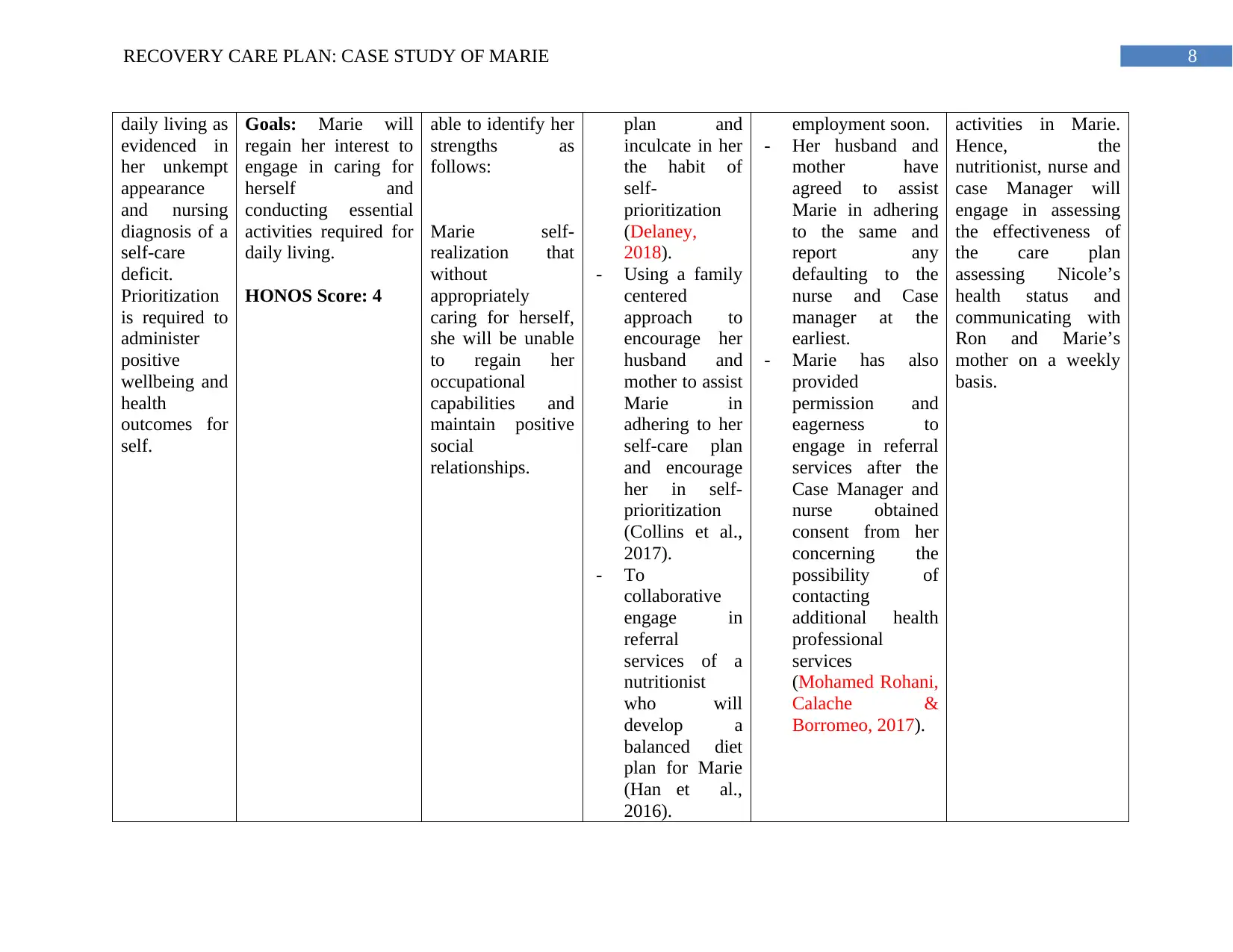
8RECOVERY CARE PLAN: CASE STUDY OF MARIE
daily living as
evidenced in
her unkempt
appearance
and nursing
diagnosis of a
self-care
deficit.
Prioritization
is required to
administer
positive
wellbeing and
health
outcomes for
self.
Goals: Marie will
regain her interest to
engage in caring for
herself and
conducting essential
activities required for
daily living.
HONOS Score: 4
able to identify her
strengths as
follows:
Marie self-
realization that
without
appropriately
caring for herself,
she will be unable
to regain her
occupational
capabilities and
maintain positive
social
relationships.
plan and
inculcate in her
the habit of
self-
prioritization
(Delaney,
2018).
- Using a family
centered
approach to
encourage her
husband and
mother to assist
Marie in
adhering to her
self-care plan
and encourage
her in self-
prioritization
(Collins et al.,
2017).
- To
collaborative
engage in
referral
services of a
nutritionist
who will
develop a
balanced diet
plan for Marie
(Han et al.,
2016).
employment soon.
- Her husband and
mother have
agreed to assist
Marie in adhering
to the same and
report any
defaulting to the
nurse and Case
manager at the
earliest.
- Marie has also
provided
permission and
eagerness to
engage in referral
services after the
Case Manager and
nurse obtained
consent from her
concerning the
possibility of
contacting
additional health
professional
services
(Mohamed Rohani,
Calache &
Borromeo, 2017).
activities in Marie.
Hence, the
nutritionist, nurse and
case Manager will
engage in assessing
the effectiveness of
the care plan
assessing Nicole’s
health status and
communicating with
Ron and Marie’s
mother on a weekly
basis.
daily living as
evidenced in
her unkempt
appearance
and nursing
diagnosis of a
self-care
deficit.
Prioritization
is required to
administer
positive
wellbeing and
health
outcomes for
self.
Goals: Marie will
regain her interest to
engage in caring for
herself and
conducting essential
activities required for
daily living.
HONOS Score: 4
able to identify her
strengths as
follows:
Marie self-
realization that
without
appropriately
caring for herself,
she will be unable
to regain her
occupational
capabilities and
maintain positive
social
relationships.
plan and
inculcate in her
the habit of
self-
prioritization
(Delaney,
2018).
- Using a family
centered
approach to
encourage her
husband and
mother to assist
Marie in
adhering to her
self-care plan
and encourage
her in self-
prioritization
(Collins et al.,
2017).
- To
collaborative
engage in
referral
services of a
nutritionist
who will
develop a
balanced diet
plan for Marie
(Han et al.,
2016).
employment soon.
- Her husband and
mother have
agreed to assist
Marie in adhering
to the same and
report any
defaulting to the
nurse and Case
manager at the
earliest.
- Marie has also
provided
permission and
eagerness to
engage in referral
services after the
Case Manager and
nurse obtained
consent from her
concerning the
possibility of
contacting
additional health
professional
services
(Mohamed Rohani,
Calache &
Borromeo, 2017).
activities in Marie.
Hence, the
nutritionist, nurse and
case Manager will
engage in assessing
the effectiveness of
the care plan
assessing Nicole’s
health status and
communicating with
Ron and Marie’s
mother on a weekly
basis.
⊘ This is a preview!⊘
Do you want full access?
Subscribe today to unlock all pages.

Trusted by 1+ million students worldwide
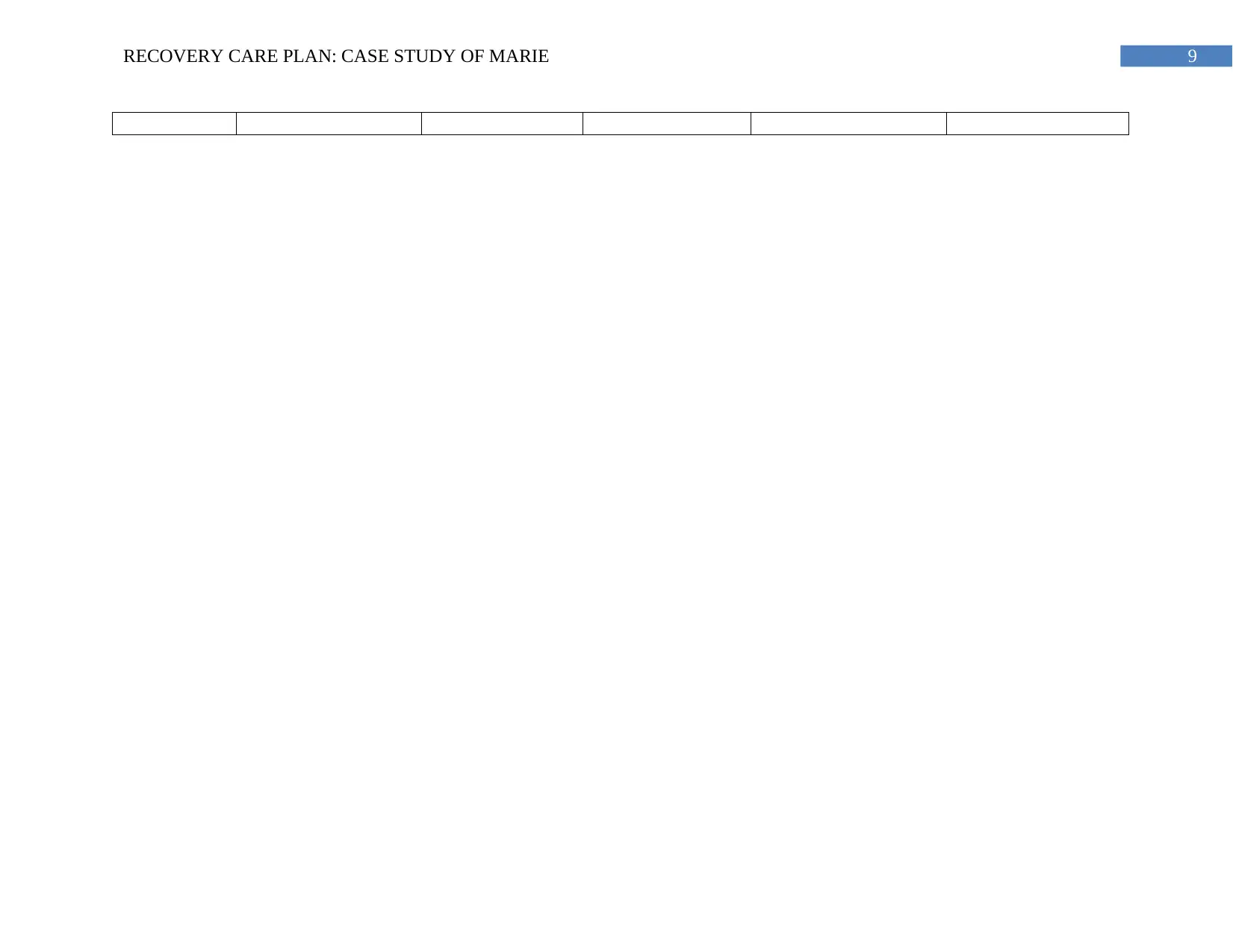
9RECOVERY CARE PLAN: CASE STUDY OF MARIE
Paraphrase This Document
Need a fresh take? Get an instant paraphrase of this document with our AI Paraphraser
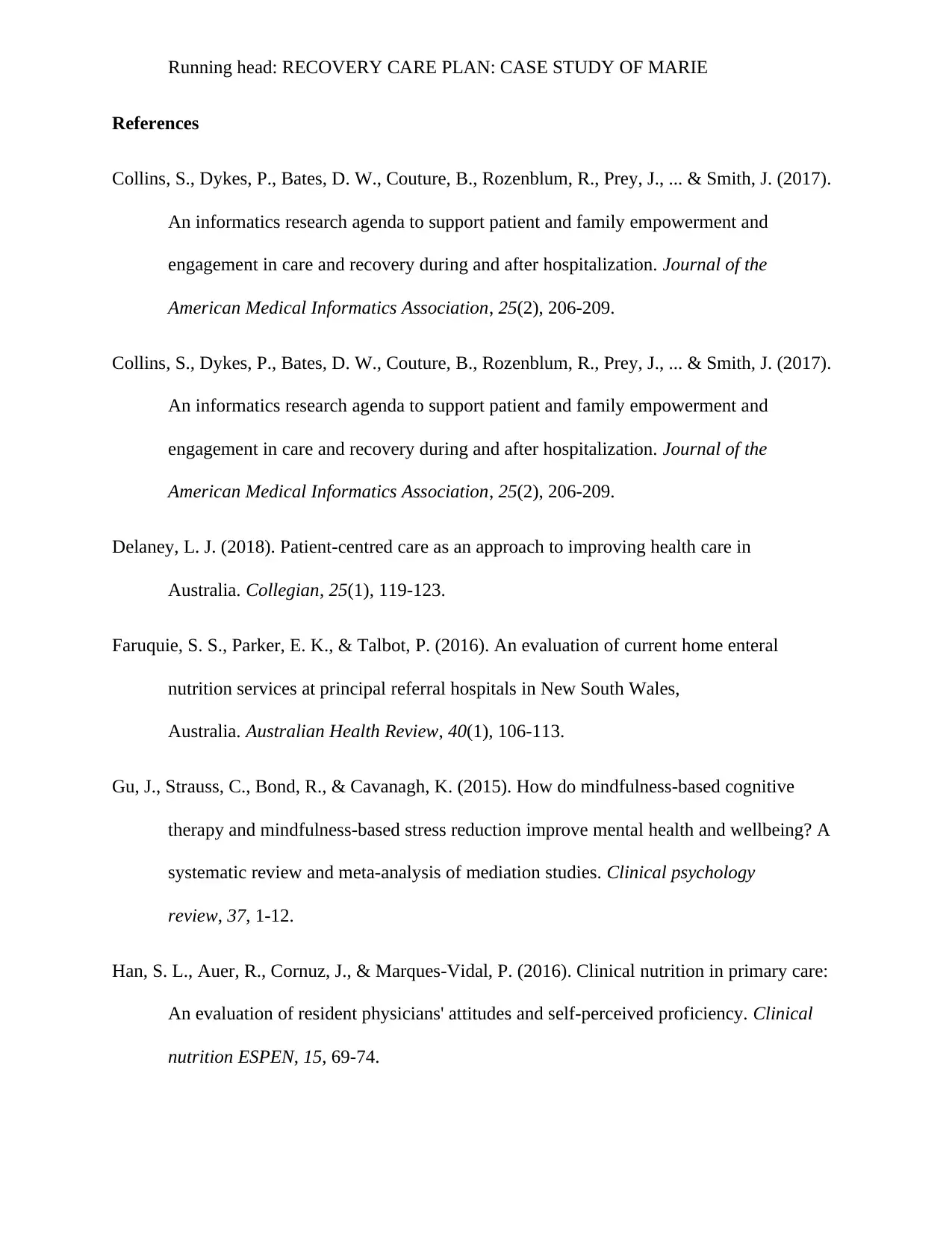
Running head: RECOVERY CARE PLAN: CASE STUDY OF MARIE
References
Collins, S., Dykes, P., Bates, D. W., Couture, B., Rozenblum, R., Prey, J., ... & Smith, J. (2017).
An informatics research agenda to support patient and family empowerment and
engagement in care and recovery during and after hospitalization. Journal of the
American Medical Informatics Association, 25(2), 206-209.
Collins, S., Dykes, P., Bates, D. W., Couture, B., Rozenblum, R., Prey, J., ... & Smith, J. (2017).
An informatics research agenda to support patient and family empowerment and
engagement in care and recovery during and after hospitalization. Journal of the
American Medical Informatics Association, 25(2), 206-209.
Delaney, L. J. (2018). Patient-centred care as an approach to improving health care in
Australia. Collegian, 25(1), 119-123.
Faruquie, S. S., Parker, E. K., & Talbot, P. (2016). An evaluation of current home enteral
nutrition services at principal referral hospitals in New South Wales,
Australia. Australian Health Review, 40(1), 106-113.
Gu, J., Strauss, C., Bond, R., & Cavanagh, K. (2015). How do mindfulness-based cognitive
therapy and mindfulness-based stress reduction improve mental health and wellbeing? A
systematic review and meta-analysis of mediation studies. Clinical psychology
review, 37, 1-12.
Han, S. L., Auer, R., Cornuz, J., & Marques-Vidal, P. (2016). Clinical nutrition in primary care:
An evaluation of resident physicians' attitudes and self-perceived proficiency. Clinical
nutrition ESPEN, 15, 69-74.
References
Collins, S., Dykes, P., Bates, D. W., Couture, B., Rozenblum, R., Prey, J., ... & Smith, J. (2017).
An informatics research agenda to support patient and family empowerment and
engagement in care and recovery during and after hospitalization. Journal of the
American Medical Informatics Association, 25(2), 206-209.
Collins, S., Dykes, P., Bates, D. W., Couture, B., Rozenblum, R., Prey, J., ... & Smith, J. (2017).
An informatics research agenda to support patient and family empowerment and
engagement in care and recovery during and after hospitalization. Journal of the
American Medical Informatics Association, 25(2), 206-209.
Delaney, L. J. (2018). Patient-centred care as an approach to improving health care in
Australia. Collegian, 25(1), 119-123.
Faruquie, S. S., Parker, E. K., & Talbot, P. (2016). An evaluation of current home enteral
nutrition services at principal referral hospitals in New South Wales,
Australia. Australian Health Review, 40(1), 106-113.
Gu, J., Strauss, C., Bond, R., & Cavanagh, K. (2015). How do mindfulness-based cognitive
therapy and mindfulness-based stress reduction improve mental health and wellbeing? A
systematic review and meta-analysis of mediation studies. Clinical psychology
review, 37, 1-12.
Han, S. L., Auer, R., Cornuz, J., & Marques-Vidal, P. (2016). Clinical nutrition in primary care:
An evaluation of resident physicians' attitudes and self-perceived proficiency. Clinical
nutrition ESPEN, 15, 69-74.
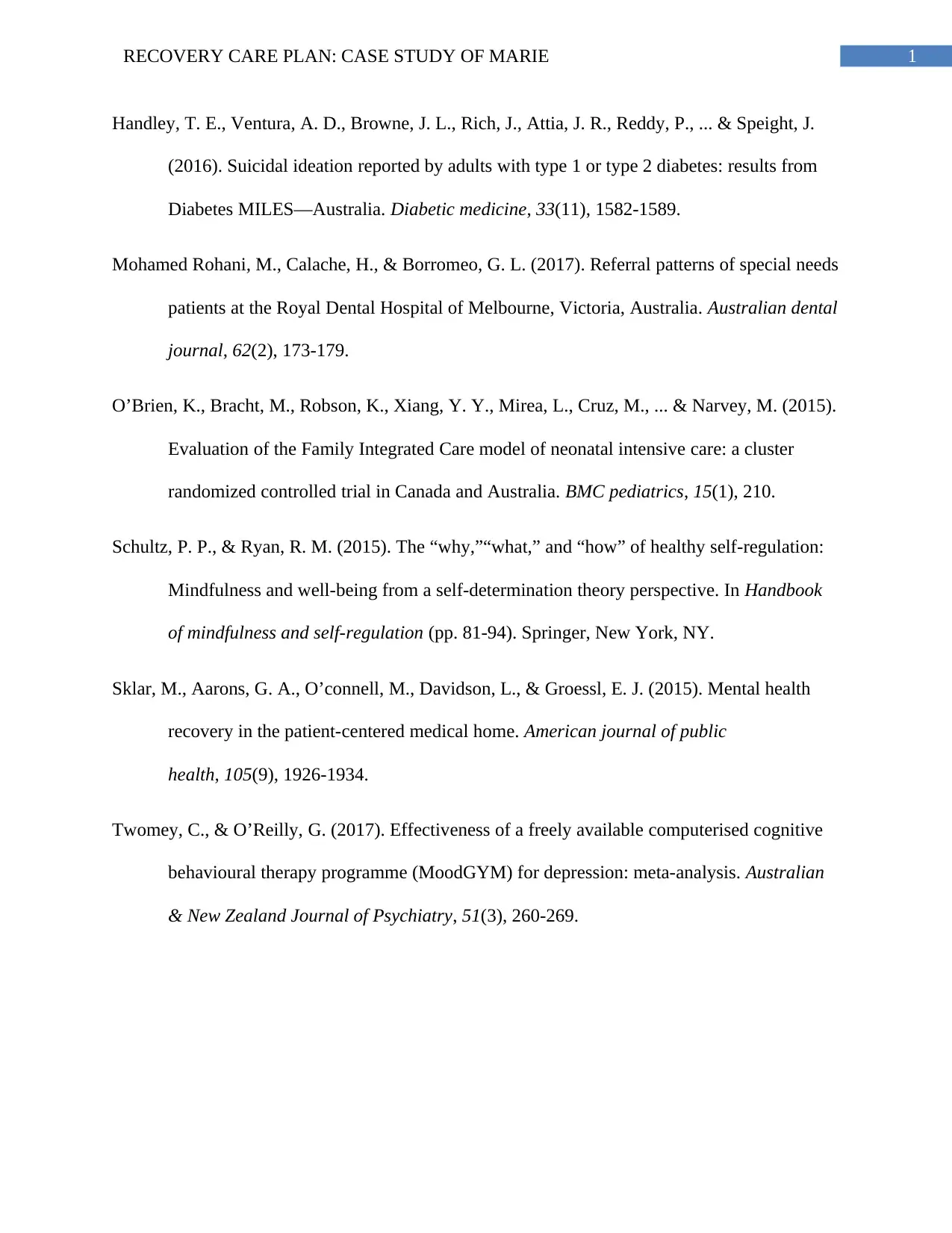
1RECOVERY CARE PLAN: CASE STUDY OF MARIE
Handley, T. E., Ventura, A. D., Browne, J. L., Rich, J., Attia, J. R., Reddy, P., ... & Speight, J.
(2016). Suicidal ideation reported by adults with type 1 or type 2 diabetes: results from
Diabetes MILES—Australia. Diabetic medicine, 33(11), 1582-1589.
Mohamed Rohani, M., Calache, H., & Borromeo, G. L. (2017). Referral patterns of special needs
patients at the Royal Dental Hospital of Melbourne, Victoria, Australia. Australian dental
journal, 62(2), 173-179.
O’Brien, K., Bracht, M., Robson, K., Xiang, Y. Y., Mirea, L., Cruz, M., ... & Narvey, M. (2015).
Evaluation of the Family Integrated Care model of neonatal intensive care: a cluster
randomized controlled trial in Canada and Australia. BMC pediatrics, 15(1), 210.
Schultz, P. P., & Ryan, R. M. (2015). The “why,”“what,” and “how” of healthy self-regulation:
Mindfulness and well-being from a self-determination theory perspective. In Handbook
of mindfulness and self-regulation (pp. 81-94). Springer, New York, NY.
Sklar, M., Aarons, G. A., O’connell, M., Davidson, L., & Groessl, E. J. (2015). Mental health
recovery in the patient-centered medical home. American journal of public
health, 105(9), 1926-1934.
Twomey, C., & O’Reilly, G. (2017). Effectiveness of a freely available computerised cognitive
behavioural therapy programme (MoodGYM) for depression: meta-analysis. Australian
& New Zealand Journal of Psychiatry, 51(3), 260-269.
Handley, T. E., Ventura, A. D., Browne, J. L., Rich, J., Attia, J. R., Reddy, P., ... & Speight, J.
(2016). Suicidal ideation reported by adults with type 1 or type 2 diabetes: results from
Diabetes MILES—Australia. Diabetic medicine, 33(11), 1582-1589.
Mohamed Rohani, M., Calache, H., & Borromeo, G. L. (2017). Referral patterns of special needs
patients at the Royal Dental Hospital of Melbourne, Victoria, Australia. Australian dental
journal, 62(2), 173-179.
O’Brien, K., Bracht, M., Robson, K., Xiang, Y. Y., Mirea, L., Cruz, M., ... & Narvey, M. (2015).
Evaluation of the Family Integrated Care model of neonatal intensive care: a cluster
randomized controlled trial in Canada and Australia. BMC pediatrics, 15(1), 210.
Schultz, P. P., & Ryan, R. M. (2015). The “why,”“what,” and “how” of healthy self-regulation:
Mindfulness and well-being from a self-determination theory perspective. In Handbook
of mindfulness and self-regulation (pp. 81-94). Springer, New York, NY.
Sklar, M., Aarons, G. A., O’connell, M., Davidson, L., & Groessl, E. J. (2015). Mental health
recovery in the patient-centered medical home. American journal of public
health, 105(9), 1926-1934.
Twomey, C., & O’Reilly, G. (2017). Effectiveness of a freely available computerised cognitive
behavioural therapy programme (MoodGYM) for depression: meta-analysis. Australian
& New Zealand Journal of Psychiatry, 51(3), 260-269.
⊘ This is a preview!⊘
Do you want full access?
Subscribe today to unlock all pages.

Trusted by 1+ million students worldwide
1 out of 12
Related Documents
Your All-in-One AI-Powered Toolkit for Academic Success.
+13062052269
info@desklib.com
Available 24*7 on WhatsApp / Email
![[object Object]](/_next/static/media/star-bottom.7253800d.svg)
Unlock your academic potential
Copyright © 2020–2026 A2Z Services. All Rights Reserved. Developed and managed by ZUCOL.





